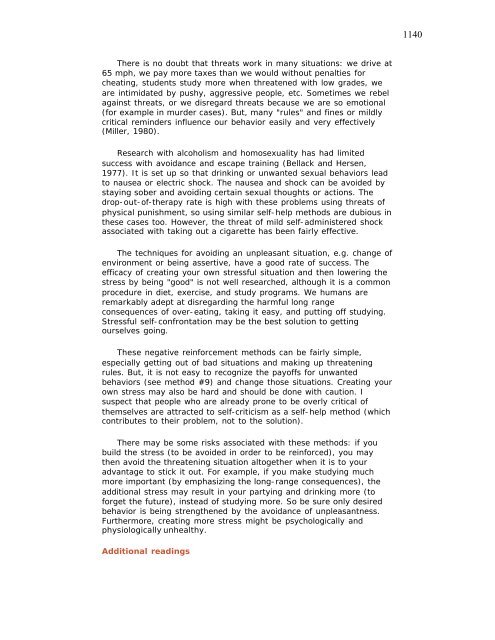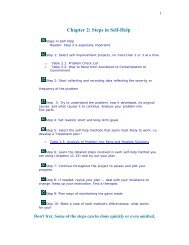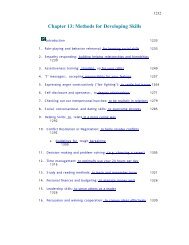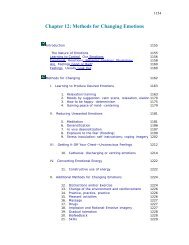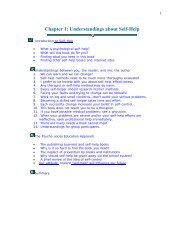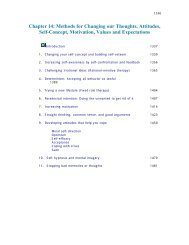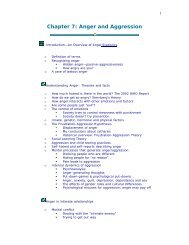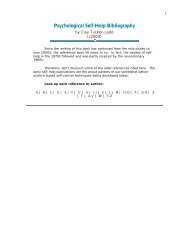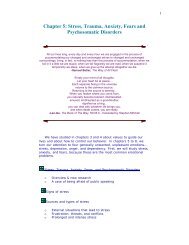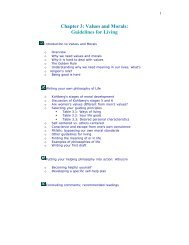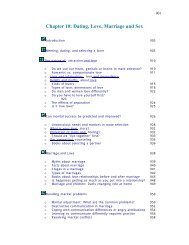Methods for Changing Behaviors - Psychological Self-Help
Methods for Changing Behaviors - Psychological Self-Help
Methods for Changing Behaviors - Psychological Self-Help
You also want an ePaper? Increase the reach of your titles
YUMPU automatically turns print PDFs into web optimized ePapers that Google loves.
There is no doubt that threats work in many situations: we drive at<br />
65 mph, we pay more taxes than we would without penalties <strong>for</strong><br />
cheating, students study more when threatened with low grades, we<br />
are intimidated by pushy, aggressive people, etc. Sometimes we rebel<br />
against threats, or we disregard threats because we are so emotional<br />
(<strong>for</strong> example in murder cases). But, many "rules" and fines or mildly<br />
critical reminders influence our behavior easily and very effectively<br />
(Miller, 1980).<br />
Research with alcoholism and homosexuality has had limited<br />
success with avoidance and escape training (Bellack and Hersen,<br />
1977). It is set up so that drinking or unwanted sexual behaviors lead<br />
to nausea or electric shock. The nausea and shock can be avoided by<br />
staying sober and avoiding certain sexual thoughts or actions. The<br />
drop-out-of-therapy rate is high with these problems using threats of<br />
physical punishment, so using similar self-help methods are dubious in<br />
these cases too. However, the threat of mild self-administered shock<br />
associated with taking out a cigarette has been fairly effective.<br />
The techniques <strong>for</strong> avoiding an unpleasant situation, e.g. change of<br />
environment or being assertive, have a good rate of success. The<br />
efficacy of creating your own stressful situation and then lowering the<br />
stress by being "good" is not well researched, although it is a common<br />
procedure in diet, exercise, and study programs. We humans are<br />
remarkably adept at disregarding the harmful long range<br />
consequences of over-eating, taking it easy, and putting off studying.<br />
Stressful self-confrontation may be the best solution to getting<br />
ourselves going.<br />
These negative rein<strong>for</strong>cement methods can be fairly simple,<br />
especially getting out of bad situations and making up threatening<br />
rules. But, it is not easy to recognize the payoffs <strong>for</strong> unwanted<br />
behaviors (see method #9) and change those situations. Creating your<br />
own stress may also be hard and should be done with caution. I<br />
suspect that people who are already prone to be overly critical of<br />
themselves are attracted to self-criticism as a self-help method (which<br />
contributes to their problem, not to the solution).<br />
There may be some risks associated with these methods: if you<br />
build the stress (to be avoided in order to be rein<strong>for</strong>ced), you may<br />
then avoid the threatening situation altogether when it is to your<br />
advantage to stick it out. For example, if you make studying much<br />
more important (by emphasizing the long-range consequences), the<br />
additional stress may result in your partying and drinking more (to<br />
<strong>for</strong>get the future), instead of studying more. So be sure only desired<br />
behavior is being strengthened by the avoidance of unpleasantness.<br />
Furthermore, creating more stress might be psychologically and<br />
physiologically unhealthy.<br />
Additional readings<br />
1140


